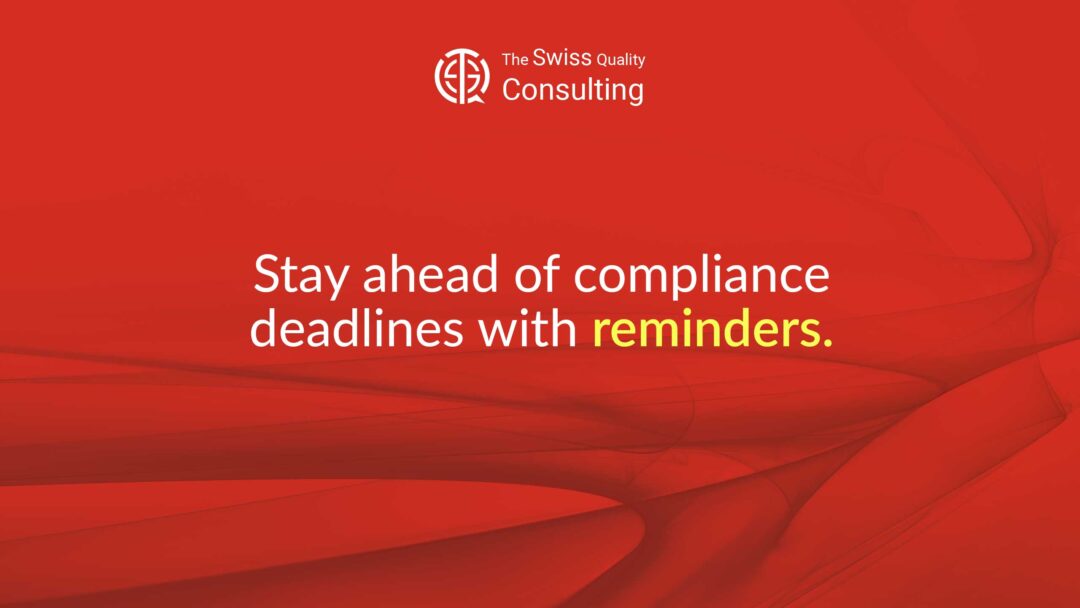Ensuring Compliance Success with Strategic Deadline Management by Staying Ahead of Compliance Deadlines
Introduction
In the complex world of business operations, staying ahead of compliance deadlines is crucial for maintaining legal and regulatory standards. This article aims to inform business executives, mid-level managers, and entrepreneurs about the importance of utilizing reminders and strategic planning to meet compliance deadlines effectively.
The Significance of Compliance in Business
Adherence to legal and regulatory requirements is not merely a matter of legal compliance; it is an integral component of business integrity, ethical conduct, and reputational standing. In today’s interconnected and increasingly scrutinized business landscape, organizations face a complex web of laws, regulations, and industry standards that govern their operations. Navigating this intricate regulatory landscape is not merely a compliance exercise; it is a strategic imperative that safeguards the organization’s reputation, protects its interests, and fosters trust among stakeholders.
At the heart of compliance lies the commitment to operating within the established legal frameworks that govern the business sector. These frameworks encompass a wide range of laws and regulations, from corporate governance and financial reporting standards to environmental protection and data privacy regulations. Failure to comply with these requirements can lead to severe consequences, including hefty fines, legal penalties, and reputational damage that can erode customer trust, tarnish brand image, and hinder future growth opportunities.
Staying ahead of evolving legal and regulatory requirements demands a proactive approach, one that goes beyond reactive measures in response to audits or investigations. Organizations that embrace a culture of compliance proactively identify applicable laws and regulations, implement robust compliance policies and procedures, and establish ongoing monitoring and evaluation mechanisms. This proactive approach ensures that the organization’s operations are consistently aligned with the evolving regulatory landscape, minimizing the risk of non-compliance and safeguarding its reputation.
The benefits of compliance extend beyond legal adherence; it fosters a culture of ethical conduct, transparency, and accountability within the organization. By embedding compliance principles into its core values and business practices, an organization sets a clear standard of behavior for its employees, promoting responsible decision-making, ethical practices, and a culture of integrity. This commitment to ethical conduct not only strengthens the organization’s reputation but also attracts and retains top talent who share its values and are committed to upholding its standards.
In essence, compliance with legal and regulatory requirements is not a mere legal obligation; it is a strategic imperative that safeguards an organization’s reputation, protects its interests, and fosters trust among stakeholders. By embracing a proactive culture of compliance, organizations can navigate the complexities of the regulatory landscape, minimize legal risks, and position themselves for sustainable growth and success in a world that demands transparency, accountability, and ethical conduct.
Building a Culture of Compliance
Adhering to compliance deadlines is integral to establishing a culture of trust and responsibility, both within the organization and with external stakeholders.
Role of Reminders in Change Management
Change management often involves navigating new regulatory landscapes. Utilizing reminders to stay ahead of compliance deadlines is essential in ensuring smooth transitions and adherence to new regulations.
Managing Regulatory Transitions Effectively
Effective change management strategies should include a robust system of reminders and checks to ensure that all regulatory deadlines are met during periods of change.
Impact on Executive Coaching and Leadership
Leadership is key in promoting a proactive approach to compliance. Executive coaching programs now focus on equipping leaders with strategies to ensure their teams are always ahead of compliance deadlines.
Instilling Proactive Compliance Practices
Leaders are trained to prioritize compliance and implement systems, such as regular reminders, to maintain a high standard of regulatory adherence.
Effective Communication and Compliance
Effective communication is vital in ensuring that all team members are aware of and understand compliance deadlines. Timely reminders play a crucial role in keeping everyone informed and aligned with compliance objectives.
Facilitating Compliance Awareness
Regular communication and reminders about compliance deadlines help create an environment where all employees are vigilant and aware of their regulatory responsibilities.
Generative AI in Compliance Management
Generative Artificial Intelligence (AI) is revolutionizing how businesses approach compliance management. AI systems can predict upcoming regulatory changes and automate the process of setting reminders for compliance deadlines.
Leveraging AI for Predictive Compliance Planning
By utilizing AI, businesses can anticipate regulatory changes and proactively set reminders, ensuring they are always prepared for future compliance requirements.
Conclusion
In conclusion, staying ahead of compliance deadlines is a critical aspect of business management. Utilizing reminders and leveraging advanced technologies like AI ensures that businesses remain compliant, avoid penalties, and uphold their reputation for integrity.
#ComplianceManagement, #BusinessIntegrity, #RegulatoryCompliance, #AIinCompliance, #EffectiveLeadership









